Bài giảng Introduction to Computer Programming (C language) - Chapter 6: Functions - Võ Thị Ngọc Châu
Content
Introduction
Functions in the standard library
An example of a function
Components of a function
Function call
Recursion
Summary
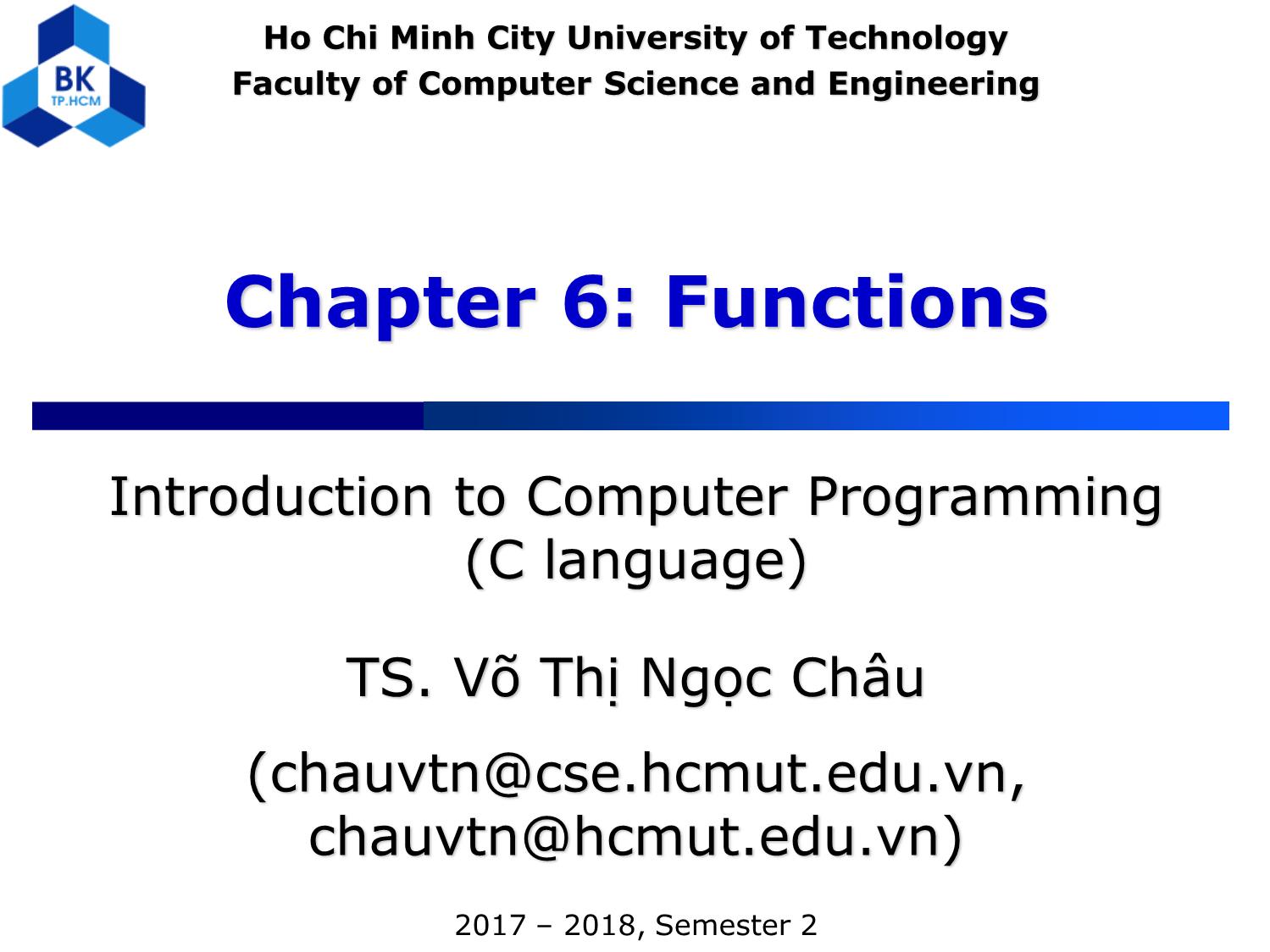
Trang 1
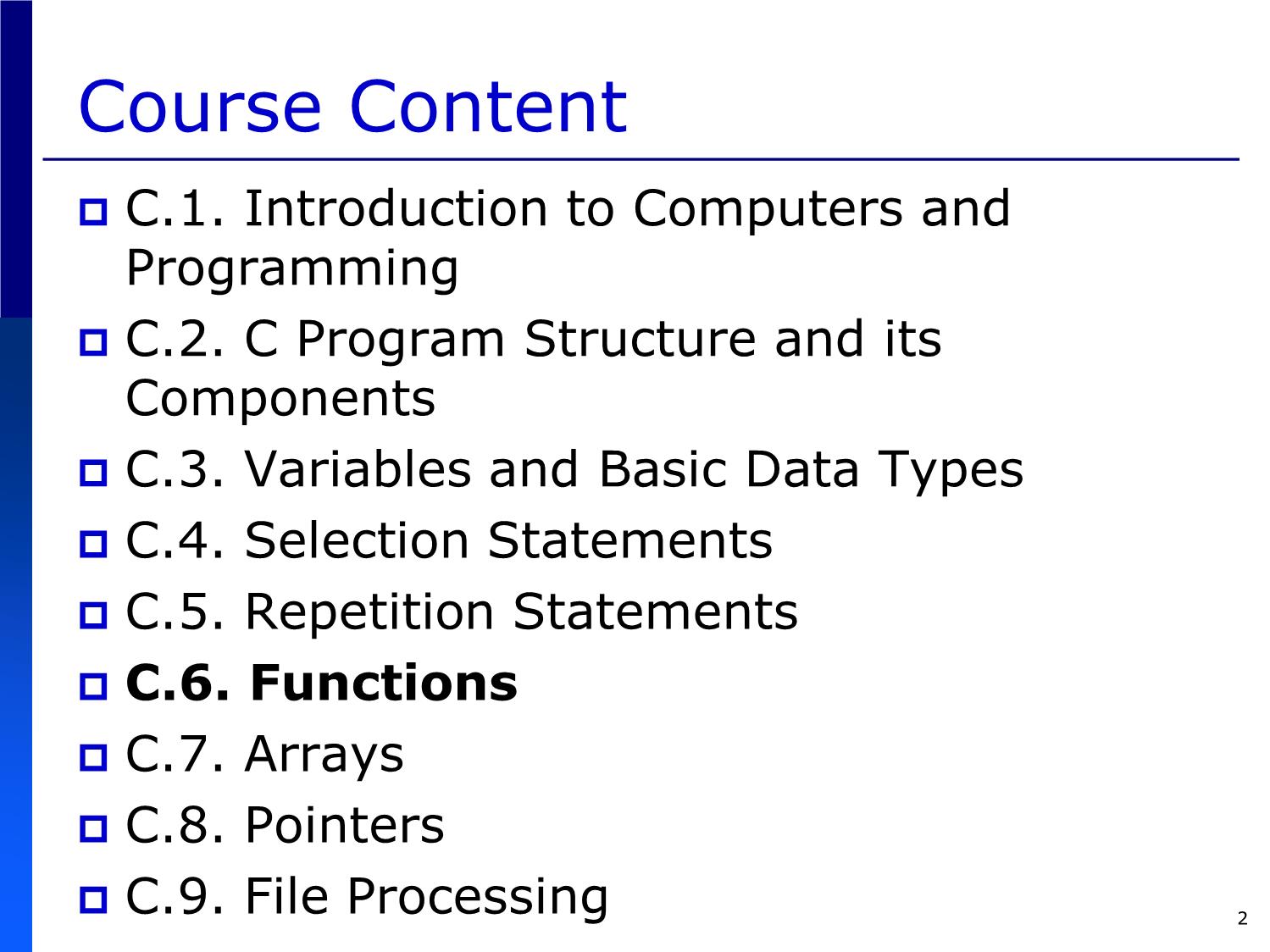
Trang 2
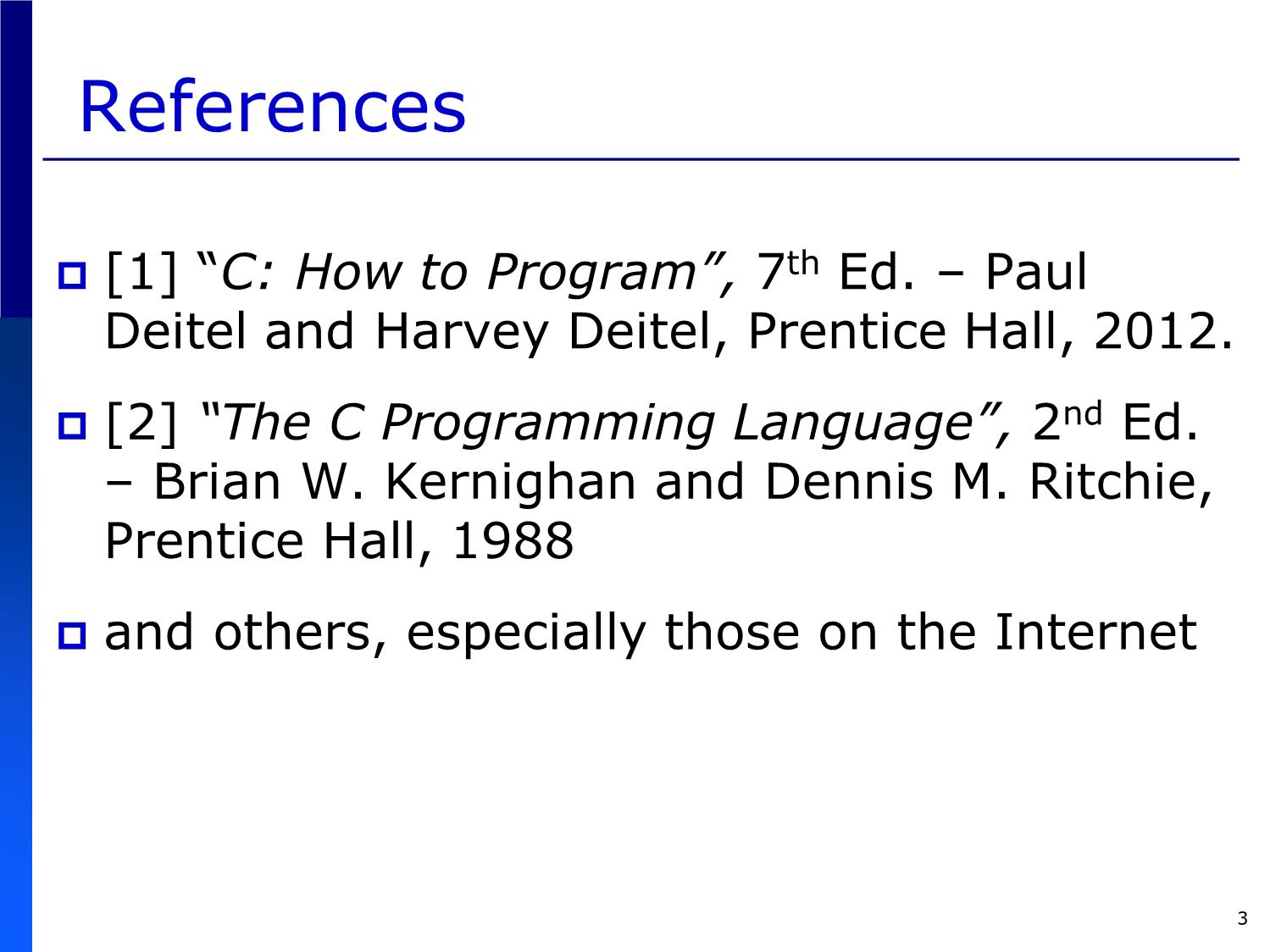
Trang 3
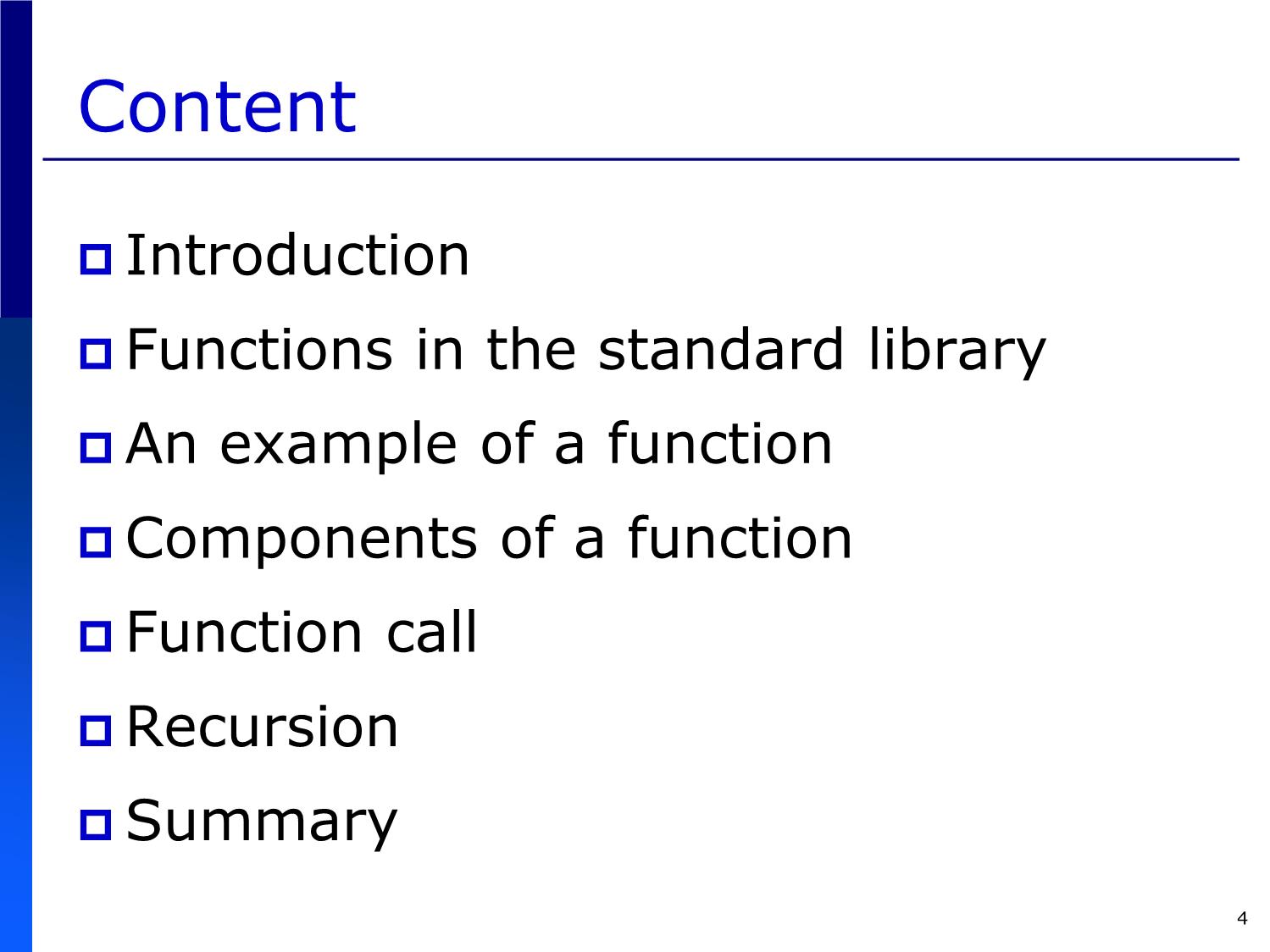
Trang 4
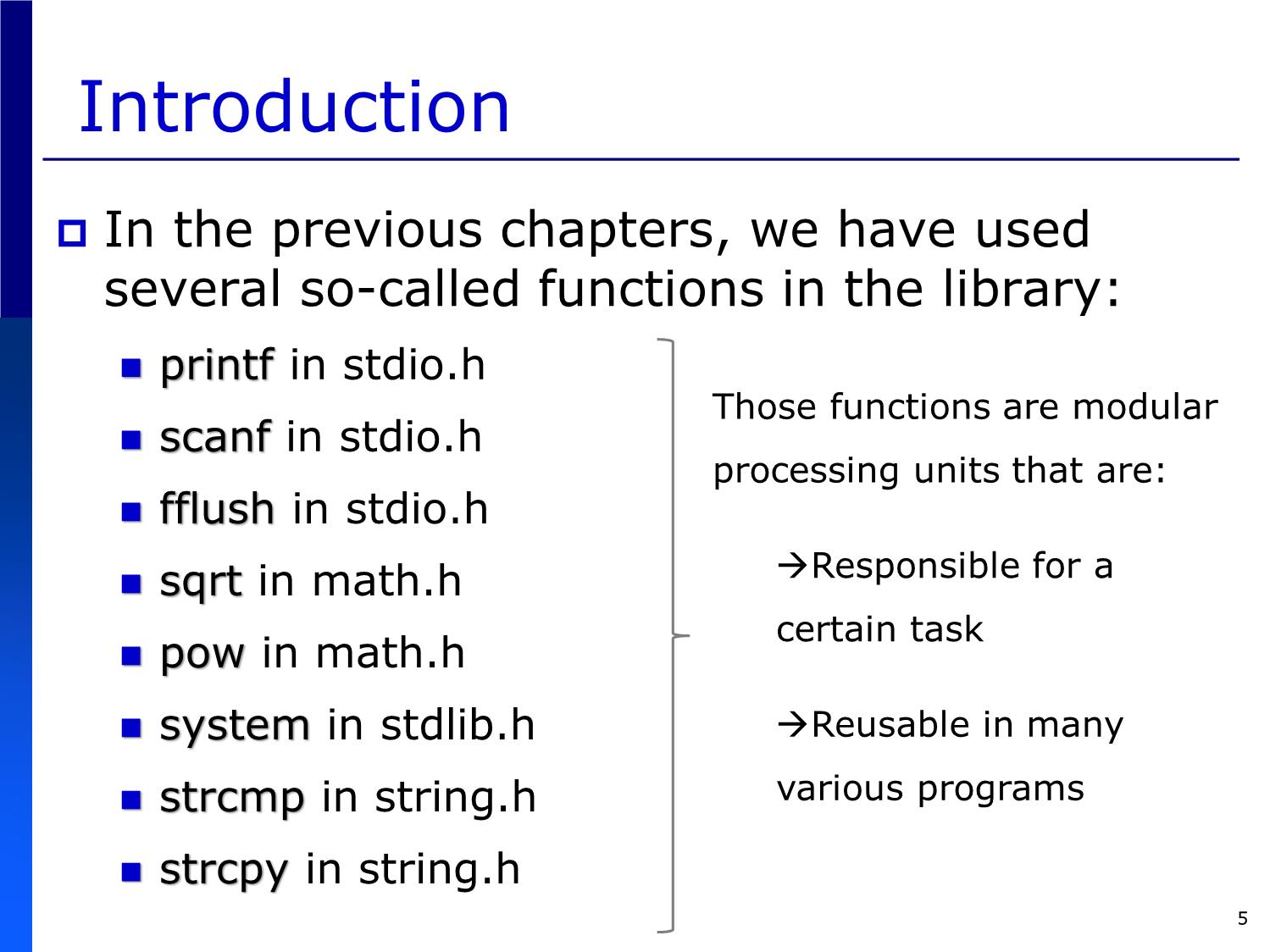
Trang 5
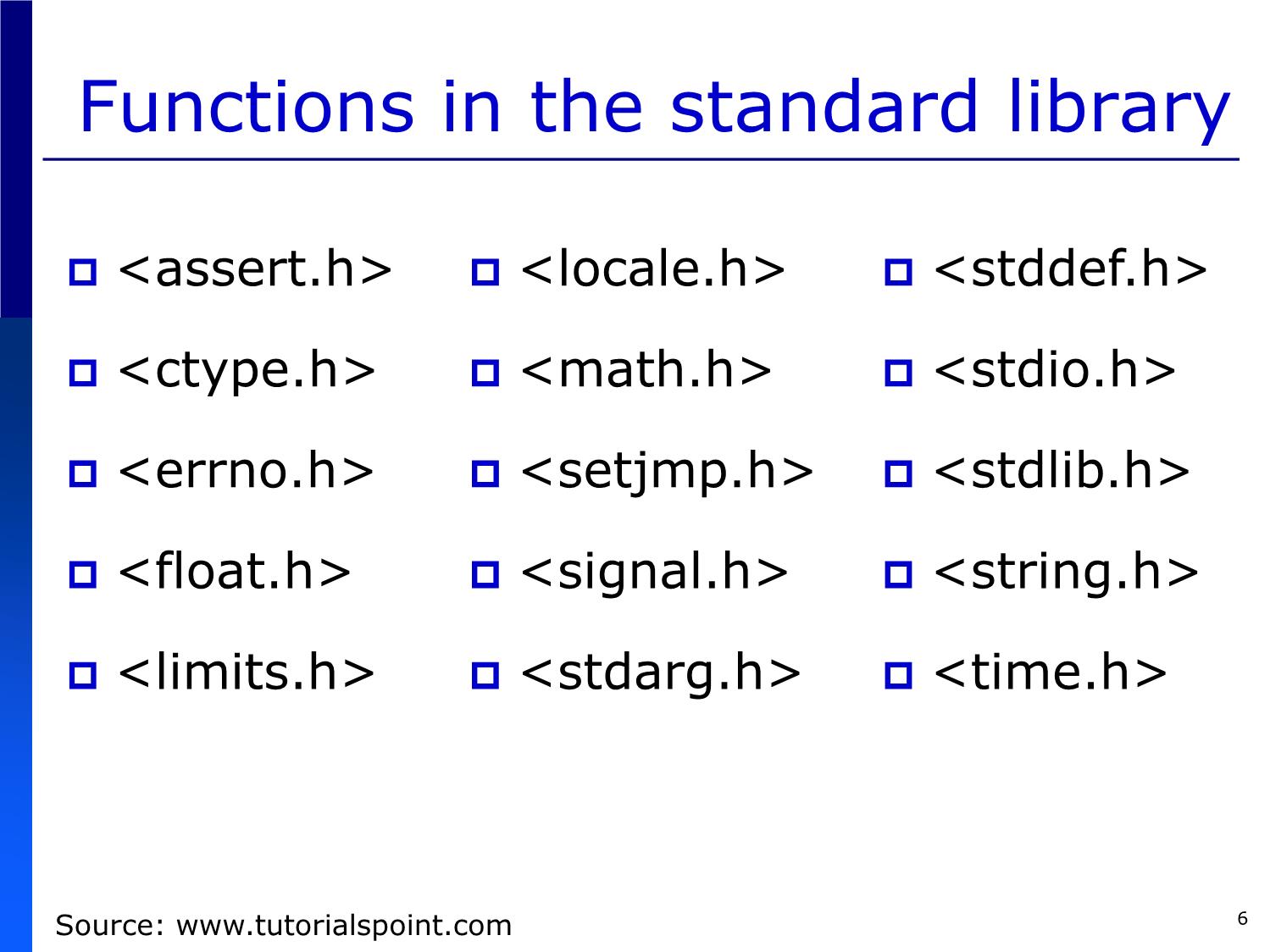
Trang 6
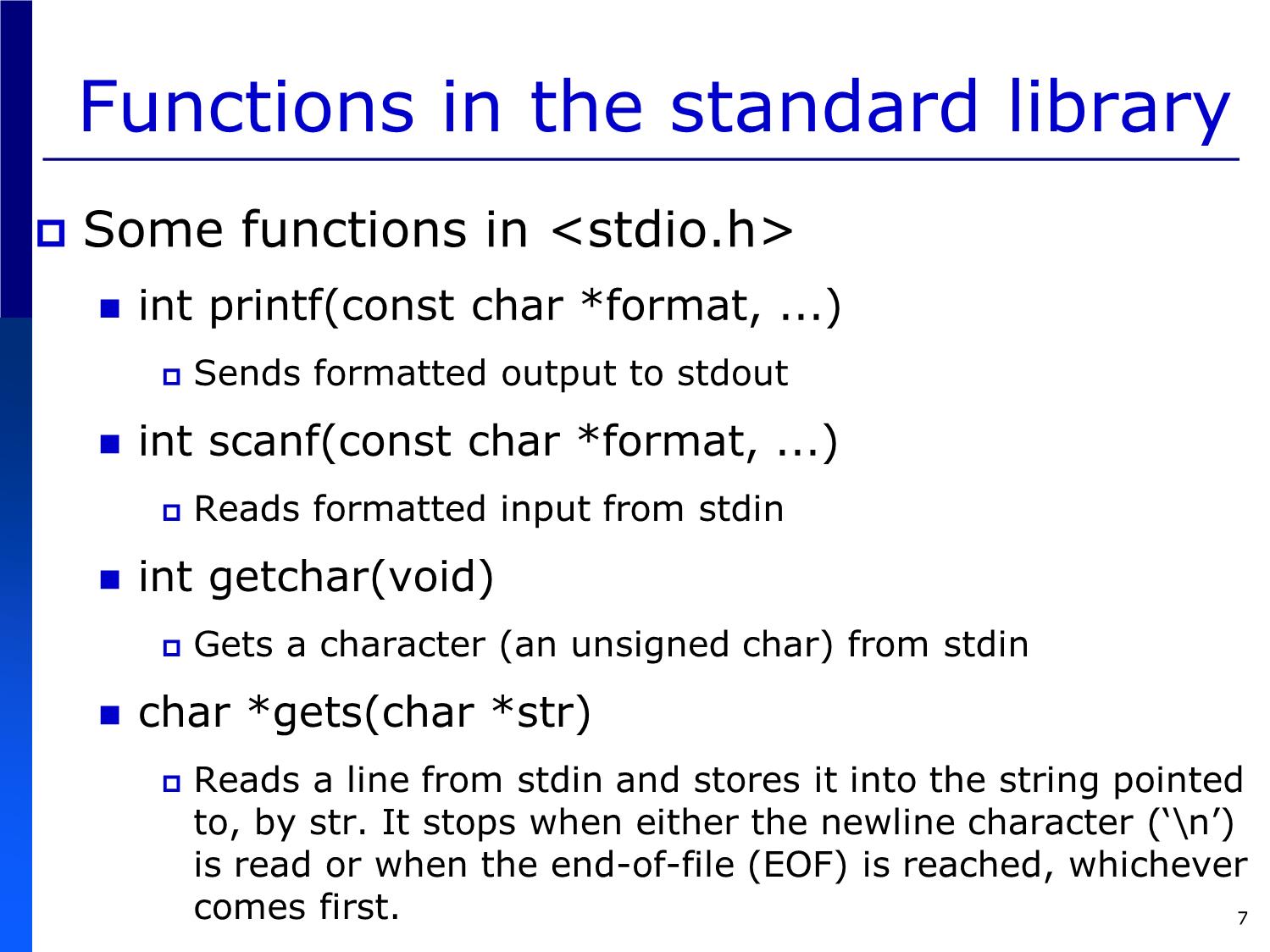
Trang 7
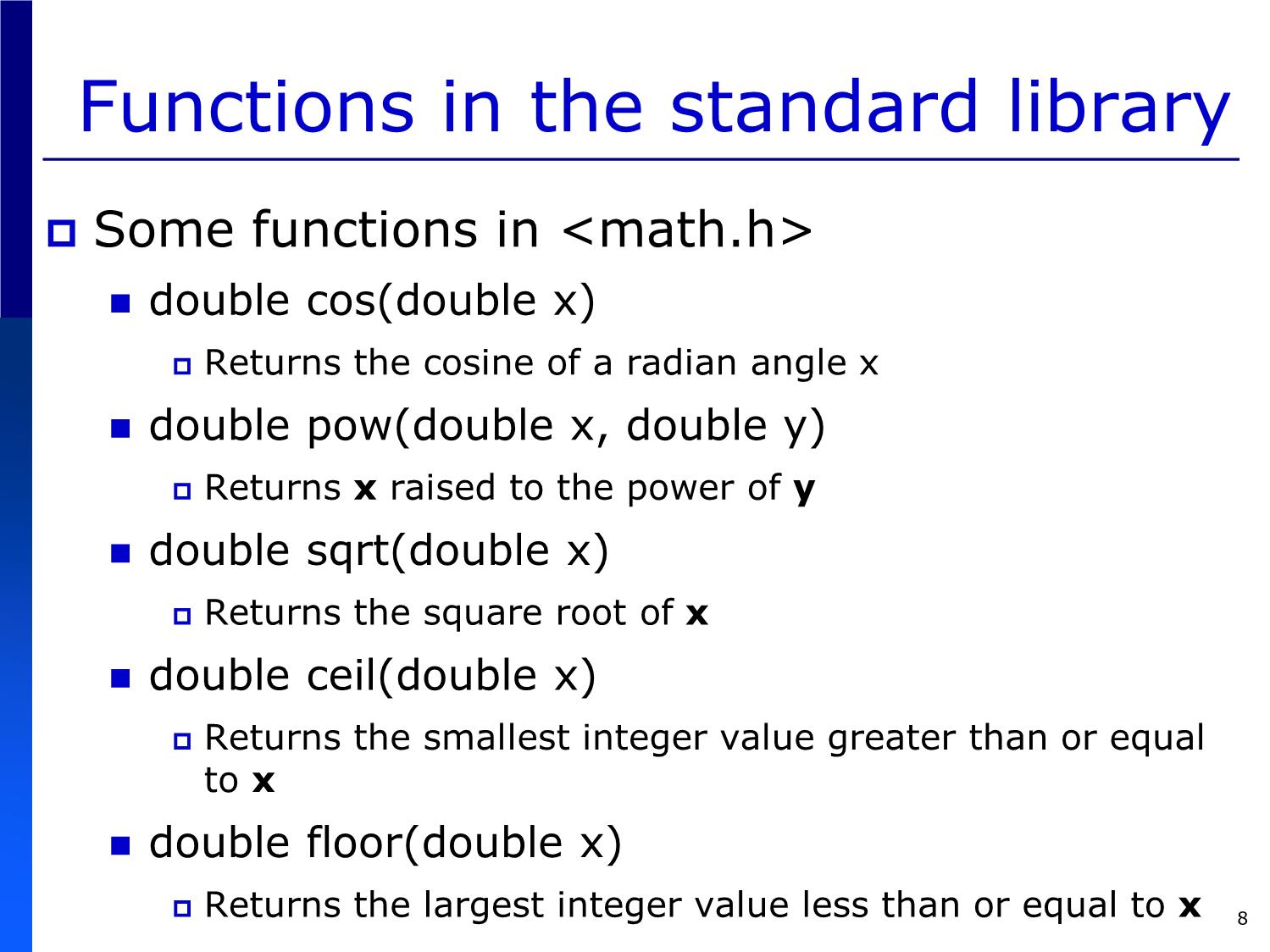
Trang 8
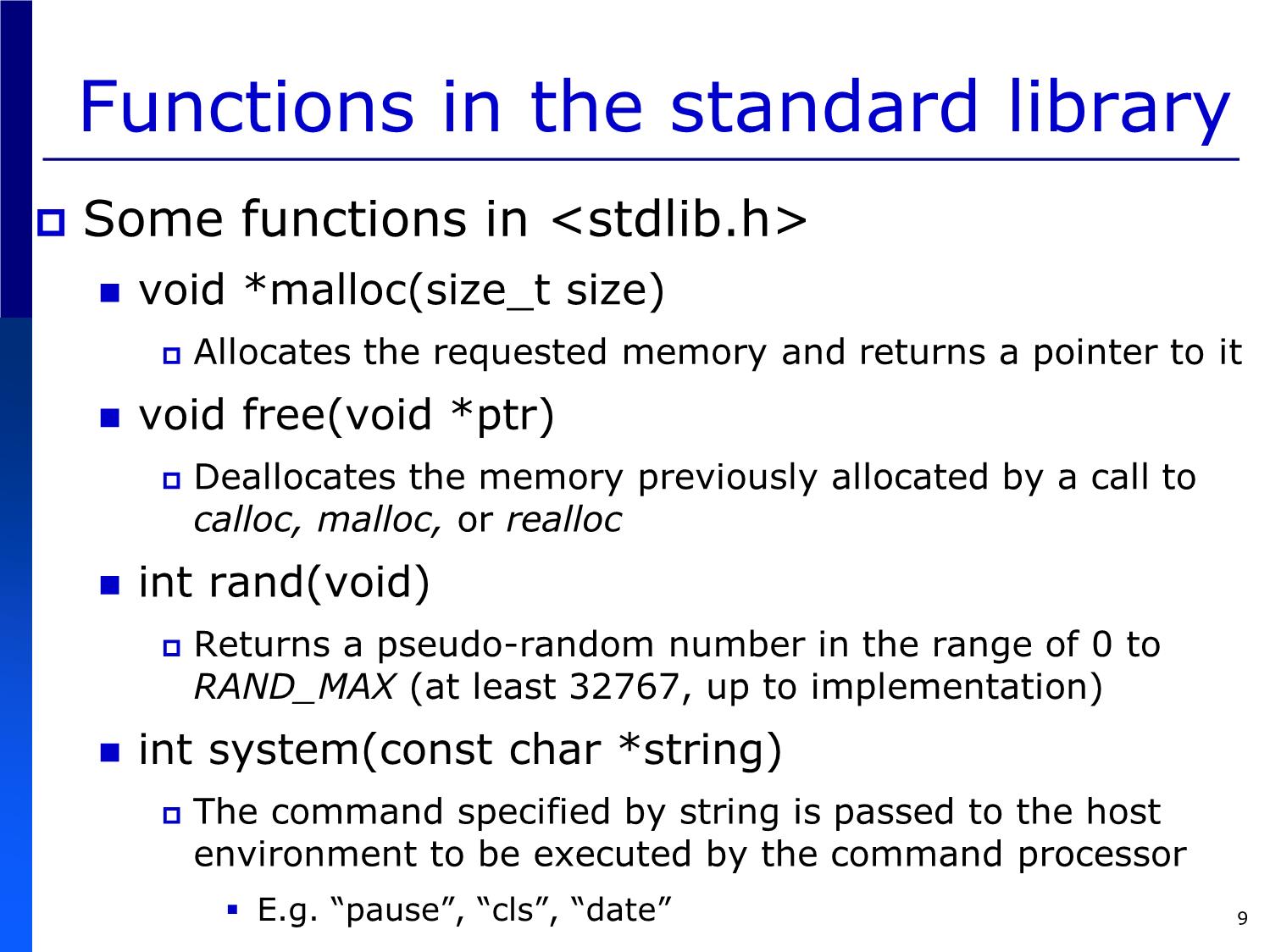
Trang 9
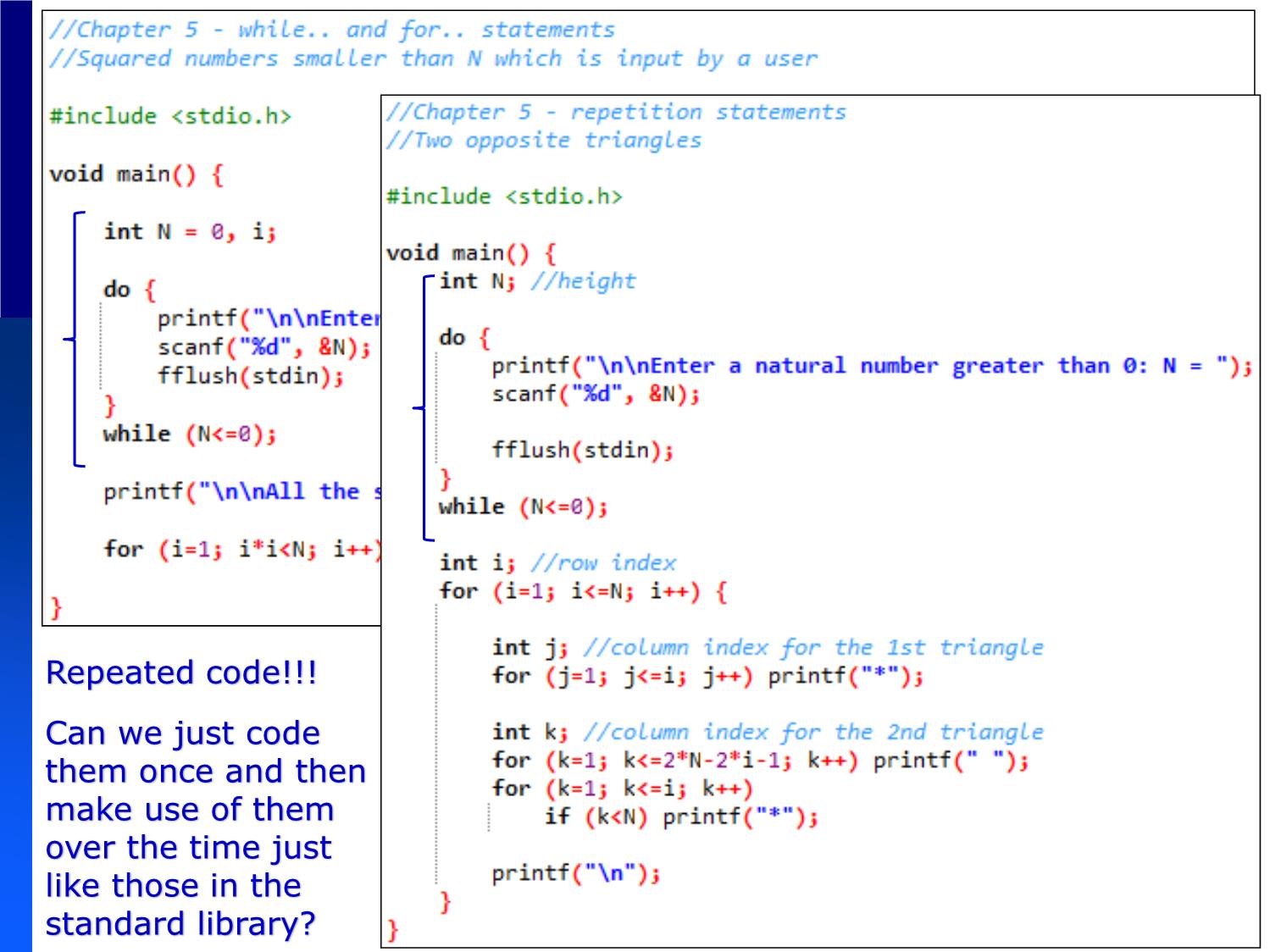
Trang 10
Tải về để xem bản đầy đủ
Bạn đang xem 10 trang mẫu của tài liệu "Bài giảng Introduction to Computer Programming (C language) - Chapter 6: Functions - Võ Thị Ngọc Châu", để tải tài liệu gốc về máy hãy click vào nút Download ở trên
Tóm tắt nội dung tài liệu: Bài giảng Introduction to Computer Programming (C language) - Chapter 6: Functions - Võ Thị Ngọc Châu
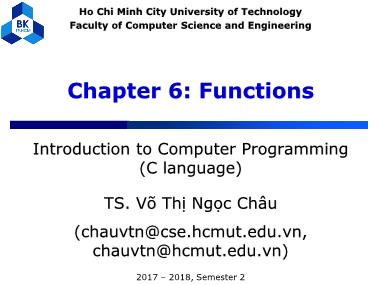
he C Programming Language”, 2nd Ed.
– Brian W. Kernighan and Dennis M. Ritchie,
Prentice Hall, 1988
and others, especially those on the Internet
3
Content
Introduction
Functions in the standard library
An example of a function
Components of a function
Function call
Recursion
Summary
4
Introduction
In the previous chapters, we have used
several so-called functions in the library:
printf in stdio.h
Those functions are modular
scanf in stdio.h
processing units that are:
fflush in stdio.h
Responsible for a
sqrt in math.h
certain task
pow in math.h
system in stdlib.h Reusable in many
strcmp in string.h various programs
strcpy in string.h
5
Functions in the standard library
Source: www.tutorialspoint.com 6
Functions in the standard library
Some functions in
int printf(const char *format, ...)
Sends formatted output to stdout
int scanf(const char *format, ...)
Reads formatted input from stdin
int getchar(void)
Gets a character (an unsigned char) from stdin
char *gets(char *str)
Reads a line from stdin and stores it into the string pointed
to, by str. It stops when either the newline character („\n‟)
is read or when the end-of-file (EOF) is reached, whichever
comes first. 7
Functions in the standard library
Some functions in
double cos(double x)
Returns the cosine of a radian angle x
double pow(double x, double y)
Returns x raised to the power of y
double sqrt(double x)
Returns the square root of x
double ceil(double x)
Returns the smallest integer value greater than or equal
to x
double floor(double x)
Returns the largest integer value less than or equal to x 8
Functions in the standard library
Some functions in
void *malloc(size_t size)
Allocates the requested memory and returns a pointer to it
void free(void *ptr)
Deallocates the memory previously allocated by a call to
calloc, malloc, or realloc
int rand(void)
Returns a pseudo-random number in the range of 0 to
RAND_MAX (at least 32767, up to implementation)
int system(const char *string)
The command specified by string is passed to the host
environment to be executed by the command processor
. E.g. “pause”, “cls”, “date” 9
Introduction
Repeated code!!!
Can we just code
them once and then
make use of them
over the time just
like those in the
standard library? 10
Introductions
Let‟s define a function: getNaturalNumber()
Declared in a header file
C6_function_getNaturalNumber_1.h
for multiple uses
Source code file: C6_function_getNaturalNumber.c
Purpose: to ask users to input a natural number
until a valid number is input 11
Use of our previously defined
function, which is declared in
a header file:
“C6_function_getNaturalNumber_1.h”
Compile:
gcc C6_starTriangle_function_1.c C6_function_getNaturalNumber.c
–o C6_starTriangle_function_1.exe 12
Introduction
A function
A processing unit to perform a specific task
A means to modularize a program for
manageable program development
C Program 1 C Program 2
main() main()
Divide-and-conquer
function1() function1() Reusable
Information hiding
function2() function3()
Abstraction
Easy for debugging
13
Introduction
Issues related to functions
Function definition
Function declaration
Function call
14
An example of a function
Prepare your own library for numbers
Compute the sum of N first natural numbers
sum = 1 + 2 + 3 + + (N-1) + N
Compute the factorial of N, a natural number
factorial = 1*2*3**(N-1)*N
Compute the n-th power of x, a floating-point
number
xn = x*x*x**x
Count the number of digits in N, a natural number
N = 123456 => Number of digits = 6
Round x, a floating-point number, with two digits
after the decimal point
x = 1.23456 => x = 1.23
x = 9.87654321 => x = 9.88 15
An example of a function
Prepare your own library for numbers
Check if a natural number is a prime number
7 => true ( 0)
8 => false (0)
Check if a natural number is a squared number
4 => true ( 0)
8 => false (0)
Toggle non-zero digits to „9‟ digits in an integer number to
generate its 9-based mask
113789 => 999999
-10789 => -90999
Count the number of occurrences of each digit in an integer
number
113789 => 0: 0; 1: 2; 2: 0; 3: 1; 4: 0; 5: 0; 6: 0; 7: 1; 8: 1; 9: 1
-20054 => 0: 2; 1: 1; 2: 1; 3: 0; 4: 1; 5: 1; 6: 0; 7: 0; 8: 0; 9: 0
An example of a function
Prepare your own library for numbers
Estimate a value of e, the natural number
Estimate a value of ex
Estimate a value of PI
17
Components of a function
Given N, a natural number, calculate the
factorial of N: N! = 1*2*..*N = (N-1)!*N
18
Components of a function
Given N, a natural number, calculate the
factorial of N: N! = 1*2*..*N = (N-1)!*N
Parameter list Function
Return with comma body that
type separation. includes
Function
which is No default declarations
name
a data value for each and
type of parameter in C statements
the value functions. performed
returned for a
return statement to return a specific task
value of a return type to the caller
19
Components of a function
[static] return-type function-name (argument-declarations)
{
declarations and statements
}
- function-name: a valid identifier
- argument-declarations: a list of formal parameters in communication
Part + Each parameter is regarded as a local variable with a data type.
of the + Each parameter can be specified with “const” for unchanged intention.
input
+ Each parameter can be passed by value or by reference if it is a pointer.
Process - declarations: a list of local variables
ing in + Each variable can be auto or static with one single initialization.
its
body - statements: zero, one, or many statements of any kind
- return-type: a valid data type or void
Part + Statement return []; in the body is used to end the
of the
output called function and return [a value] to its caller. If not, close brace of the
body ends the called function and program control is switched to its caller.
- [static]: optional specification to make the function available only in the file
Charac
teristic where it is defined. 20
Concepts related to functions
Function definition:
[static] return-type function-name (argument-declarations)
{
declarations and statements
}
Function prototype:
return-type function-name (argument-declarations);
Function signature:
[extern] return-type function-name (argument-declarations)
No concept of “nested functions”!
Implementation-dependent 21
Where is a function defined and
declared?
A function definition can be placed in:
the same file where the main() function is
Before the main() function
After the main() function
a separated file where the main() function is not
Regardless of where a function is defined, its
declaration is required before any call to it.
Function prototype in the global declaration section
Function prototype in a header file for common use
22
A program for an approximation
of the x-th power of e
Function definition
= Function declaration
(as it is placed before its call)
Function declaration
a call to a function
Function definition
(a function declaration is required
as it is placed after its call.)
23
Where is a function defined and
declared?
SEPARATED FILES
Function declaration
Function
definition
Function calls
24
Where is a function defined and
declared?
Source file
getFactorial.c
25
Where is a function defined and
declared?
Source file
getPower.c
26
Where is a function defined and
declared?
Header file for common use
mynumber.h
27
Function call
Function call is a mention of a function to
another function or itself.
The function whose function body contains a a
mention is called a calling function or a caller.
The function whose name is mentioned in the caller‟s
function body is called a called function or a callee.
The caller is the same as or different from the callee.
The program in C6_function_myNumber
The main() function calls the printf(), scanf(), pow(),
factorial(), and power() functions.
Caller = main
Callees = printf, scanf, pow, factorial, power
28
Function call
A function call is mentioned in the function
body of the caller as:
function-name (argument-list)
argument-list
Optional, i.e. empty if the callee has no argument
Each argument is called actual parameter which is an
expression corresponding to a formal parameter by order.
Each argument has a type compatible with the type of its
corresponding formal parameter. Otherwise, type
conversion with promotion or truncation is performed.
Assignment of each expression value to the
corresponding formal parameter‟s memory is performed.
A value of a return type (if it is not void) is
returned via this function call. 29
Stack‟s values when i=0 in the
Function call main() function
Caller‟s stack Callee‟s stack
0 i 2 x
10 n 0 n
2 x i
0 e_x aPower
The caller
The callee 30
Function call
Function call by value
Parameters are passed by value.
The actual parameter values are copied into local storage
of the formal parameters of the callee.
The caller and callee do not share any memory.
Function call by reference
C has no explicit reference parameters but
implements them via pointers, i.e. address passing.
Pointers are passed to the arguments.
There is only one copy of the value at any time.
The caller and callee have access to the value in
their shared memory through pointers.
31
Function call
A function to swap two integer numbers
void swap(int a, int b){
int temp;
a and b will be passed by
temp = a; values of int type.
a = b;
b = temp;
}
void swap(int *a, int *b){
int temp;
temp = *a; a and b will be passed by pointers
*a = *b; to int values, i.e. addresses of the
memory that contains int values.
*b = temp;
}
32
Function call by value
Change on formal parameters in the callee has
no impact on actual parameters in the caller. 33
Function call by value
Stack‟s values when a=10 and
b=9 in the main() function
Caller‟s stack Callee‟s stack
10 a 10 a
9 b 9 b
temp
Stack‟s values
before the callee
ends
Callee‟s stack
9 a
10 b
10 temp
34
Function call by reference
Change on the shared memory can be made by both
callee and caller. Pointers are used for reference. 35
Function call by reference
Stack‟s values when a=10 and
b=9 in the main() function
Caller‟s stack Callee‟s stack
000000000022FE4C
10 a &a 000000000022FE4C a
000000000022FE48 &b
9 b 000000000022FE48 b
temp
Stack‟s values
before the callee
ends
Caller‟s stack Callee‟s stack
000000000022FE4C
9 a &a 000000000022FE4C a
000000000022FE48 &b
10 b 000000000022FE48 b
10 temp
36
Recursion
A recursive function is a function that calls
itself either directly or indirectly.
When a function calls itself recursively, each
invocation gets a fresh set of all the automatic
variables, independent of the previous set.
Function to compute the factorial of n:
non-recursive vs. recursive versions 37
rFactorial(10) rFactorial(10) 3628800
Recursion path 10*rFactorial(9) 10*9* 8*7*6*5*4*3*2*1*1
9*rFactorial(8) 9* 8*7*6*5*4*3*2*1*1
8*rFactorial(7) 8*7*6*5*4*3*2*1*1
7*rFactorial(6) 7*6*5*4*3*2*1*1
6*rFactorial(5) 6*5*4*3*2*1*1
5*rFactorial(4) 5*4*3*2*1*1
4*rFactorial(3) 4*3*2*1*1
3*rFactorial(2) 3*2*1*1
2*rFactorial(1) 2*1*1
Recursive cases
with smaller sizes 1*rFactorial(0) 1*1
Return path
1 1
Base case 38
Recursion
Writing a recursive function
Determine and write the base cases and their
solutions
No recursive call is specified for those base cases.
Determine and write the recursive (inductive)
cases and their solutions
Establish a connection between the larger problem and
the smaller problems using recursive calls
Determine the other cases that are neither base
nor recursive cases
Check for other constraints with no recursive call
39
Recursion
Compute the sum of N first natural numbers
sum = 1 + 2 + 3 + + (N-1) + N
Base case: sum(1) = 1
Recursive case: sum(N) = sum(N-1) + N
Compute the factorial of N, a natural number
factorial = 1*2*3**(N-1)*N
Base case: factorial(0) = factorial(1) = 1
Recursive case: factorial(N) = factorial(N-1)*N
Compute the n-th power of x, a floating-point
number
xn = x*x*x**x
Base case: power(x, 0) = 1
Recursive case: power(x, n) = power(x, n-1)*x 40
Recursion
Estimate a value of e, the natural number
Base case: e(0) = 1
Recursive case: e(n) = e(n-1) + 1/factorial(n)
41
Recursion
Estimate a value of ex
Base case: e_x(0) = 1
Recursive case:
e_x(n) = e_x(n-1) + power(x, n)/factorial(n)
42
Recursion
Estimate a value of PI
Base case: pi(0) = 4
Recursive case:
pi(k) = pi(k-1) + power(-1, k)*4/(2*k+1)
43
Recursion
Hanoi Tower
Move disks from peg 1 to
peg 3 using peg 2 as a
temporary holding area in
such a way that smaller
disks are always on top of
larger disks and one disk peg 1 peg 2 peg 3
is moved at a time
A recursive function with 4 parameters:
a). The number of disks to be moved
b). The peg on which these disks are initially threaded
c). The peg to which this stack of disks to be moved
d). The peg to be used as a temporary holding area 44
Recursion
Hanoi Tower
45
Hanoi Tower
peg 1 peg 2 peg 3
46
Recursion
Recursive function‟s concern
No saving in storage
Not faster
Infinite recursion
No base case is defined or base case can not be reached.
Recursive function‟s advantages
Compact recursive code
Easy to write and understand
Convenient for recursively defined data structures
and problems
47
Summary
A function is a processing unit for a specific
task.
Divide-and-conquer approach
Reusability
Information hiding
Abstraction
Support for debugging
Manageable program development
48
Summary
Function definition
Function declaration
Function call
By value
By reference with pointer implementation
Recursion
Recursive problem
Recursive data structure
49
Chapter 6: Functions
50 File đính kèm:
 bai_giang_introduction_to_computer_programming_c_language_ch.pdf
bai_giang_introduction_to_computer_programming_c_language_ch.pdf

